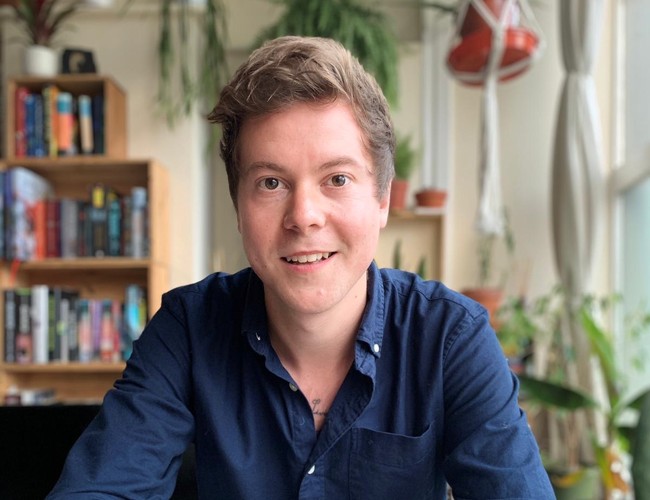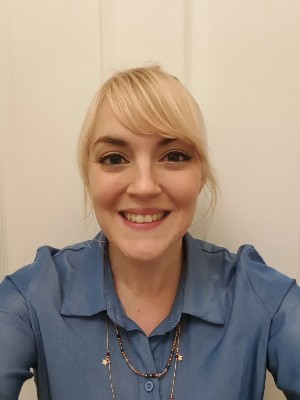Career changer stories
Thinking about changing direction in your career, or choosing a new path after your first degree? Speech and language therapy offers a wide range of routes, clinical areas and progression opportunities.
Read about how others have made the move to speech and language therapy from other fields.
David’s story
David had worked in all kinds of jobs, but none ever felt quite right – until he tried speech and language therapy and went to university as a mature student.

The eureka moment
I stumbled upon speech and language therapy as a happy accident. I was looking into studying psychological counselling and had met with a therapist to discuss the varying ways into the profession. I realised how long it would take to become a qualified counsellor and weighed up the financial barriers into the profession, before discovering speech and language therapy on a university program list.
I did my research, read a book or two, watched some clips of videofluoroscopy and FEES (fibreoptic endoscopic evaluation of swallowing) and ended up calling the program leader at De Montfort University for a little more information. She was very obliging, despite my incessant questions.
Having had the premise of what an SLT does explained to me, I had a bit of a eureka moment. I’ve always struggled to find genuine purpose and spent most of my twenties drifting between jobs; bored by what I was doing, tired of earning little more than minimum wage and too indecisive to do anything about it. This felt like a jigsaw-falling-into-place moment, and I applied to the two universities closest to where I was moving to. I was lucky enough to be given a place, and off to De Montfort I went.
Putting people at the heart of work
Speech and language therapy feels like a culmination of many of the things I’ve done so far in life, a next logical step forward. I’ve been an actor and a warehouse manager, a youth theatre practitioner, and a car rental salesman. I worked in and managed bars for over a decade. Each of these vocations are steeped in sociability and I think that’s why speech and language therapy feels right – people are the heart of it. Like a lot of those drawn to this profession, I’m at my best when I work with people, and if I can make a positive difference to a few of them, I’d call that time very well spent.
Returning to learning
It can be disconcerting going back into education as a mature student. Not only because many of your peers are a decade younger than you, but because you’re so out of academic practice. I would not have regarded myself as a particularly organised person before I started the course, but I made a vow that I would be by the end of it.
In many ways, I’m glad I didn’t go to university when I was 18 as I only would have thrown the opportunity away and had far more fun than was good for me. With a little clarity and a few years on my back, I’m a far more disciplined and dedicated student than I might have been. I’m glad I find myself here, knowing where I’m heading and how to get there.
My top tips
A few bits of advice for prospective students thinking about going back to study:
- Be organised. It isn’t easy, but it is completely manageable if you stay on top of the workload
- Ask questions. I’m sure my lecturers roll their eyes every time they get another email from me, but they are kind, obliging and experts in their field. They are a brilliant resource and will give as much as you ask of them.
- Grab every opportunity you can. In the past 12 months, I’ve been lucky enough to be involved in half a dozen different projects. Join steering groups, organise events and conferences, apply for studentships and research assistant positions. At the moment, I’m the AHP Coordinator for the Social Prescribing Student Champion Scheme and a Data Research Assistant for the brilliant DMU Frontrunner Program. I’m also just about to start a 15-week placement in an acute stroke ward.
- Just do it! If you’re on the fence about becoming a speech and language therapist, have a chat with a qualified practitioner – we’re all pretty friendly here.
Ashley’s story
Ashley worked as an administrator before a few chance events led her to discover speech and language therapy. From there she researched courses, got a place at university, and now supports people who have had a brain injury.
Finding my ‘something different’

As an administrator within the NHS, I first toyed with the idea of going back to university to do ‘something different’ while requesting prospectuses for my younger brother (now a doctor). At that time, I didn’t know that speech and language therapy existed.
I wouldn’t say there was a defining moment that led me to discover the profession, just a few things happened, such as an SLT being on a TV program that I watched, then I read a book that featured an SLT, and then a family member had a stroke and they worked with an SLT. Having always been fascinated by language and how we communicate I took all these small encounters as a sign – I had finally found my something different.
The application process
I contacted all of the universities that offered the degree with information about my background and previous qualifications to get an idea of what my chances would be. My local university was upfront and said that I would not be a strong enough candidate. Others gave me advice about relevant reading, short courses and how I might go about getting some relevant experience. Thankfully, despite being well into my late twenties I was able to relocate to study and the local ‘rejection’ did not deter me. I followed every piece of advice that I had received.
I set to work with applying for an Access to Higher Education Diploma at a local further education college as it had been a while since I had done any studies. Then I applied to the universities that were most helpful and positive towards my initial enquiries. The access courses are great at getting you back into good study habits, and (if the UCAS process is still the same) you will also get a good reference from your tutor in support of your university application – they want you to succeed.
Putting my skills on paper
The personal statement was so hard to write, I knew I had the right transferable skills, but how would I demonstrate this on paper? I enlisted the help of friends, work colleagues and family to help give me some perspective – it is amazing how they remember the things that you have done more than you do. My best friend, a primary school teacher also arranged for me to spend a couple of days in her classroom and gave me some feedback that I could use too. Off went my application and in came the interview offers.
While the universities are choosing you, it’s important to remember you are also choosing them. I had an interview at what I thought was my first choice, but I didn’t leave the interview day buzzing about it.
I had another interview at a different uni (which I didn’t even apply to initially) and straight away I knew it was where I wanted to go. They gave me an unconditional offer quite quickly and I simply withdrew my applications from the others. I was so excited, but equally apprehensive about what uni life would be like with all the young ones.
Taking the plunge
I wasn’t the only mature student on the course. There was a really diverse range of people on the course, with some coming straight from their A Levels, others were parents to teenagers. Like me, there were many career changers.
I made new friends that will last a lifetime and the tutors were incredibly supportive. If ever I had any issues, I knew I could talk to them and they would be there. I always felt that they really understood how tough things could be, because, once upon a time, they were in a similar position.
Fast-forward a few years and I am a fully qualified SLT.
Was it hard to drop a full-time income? Yes!
Was it hard to move away from home? Yes!
Was it hard to study? Yes!
Did I want to give up several times? Yes!
But did I? Not a chance!
And was it all worth it? Absolutely!!!!!
Where I am now
I started off in a rotational post covering several adult caseloads, such as acute stroke, acute wards, adult community, and stroke early supported discharge. I completed my dysphagia (swallowing) competencies by doing a postgraduate module alongside the practical experience that my newly qualified post gave me. As a foodie, I feel really passionate about people being able to enjoy mealtimes safely. I think the process of swallowing is fascinating and love a bit of patient education, getting my diagrams out to explain what is happening and what isn’t working as it once did. That understanding for me is key and really helps to empower patients and their carers to take practical steps to keep safe, but also be able to enjoy life.
I now work in a neurorehabilitation setting supporting people who have had an injury to the brain, largely looking at their social and cognitive communication skills which we really take for granted when we are well, but life after injury in the social world that we live in can be really tough.
I think one of the best things about being a speech and language therapist is that it is so diverse, and every day, whatever setting you go into there is something new to learn.
Related content
Career changers and mature students
Find out about changing career and going back to learning
University degrees
Learn more about undergraduate and master’s degrees
Speech and language therapy apprenticeships
Prefer to earn while you learn? Read about the new apprenticeship


